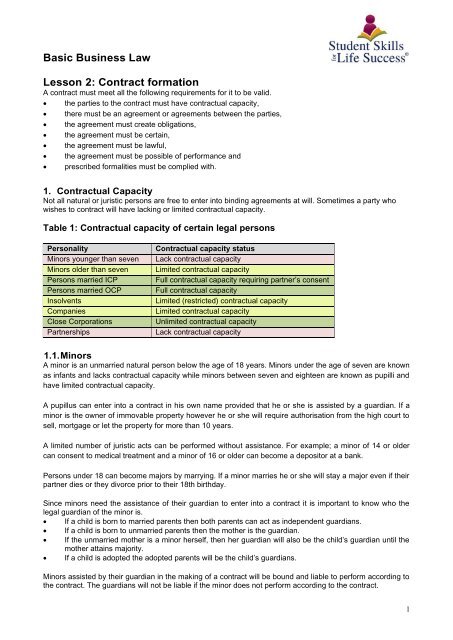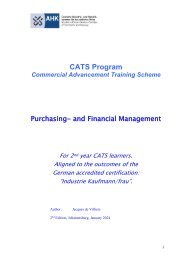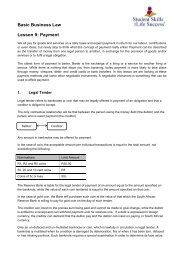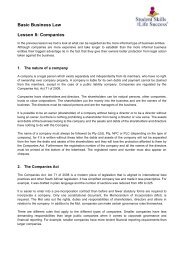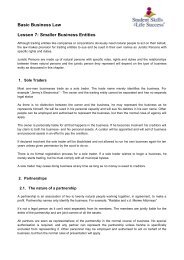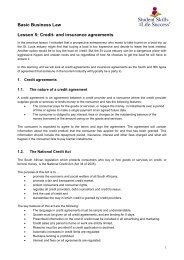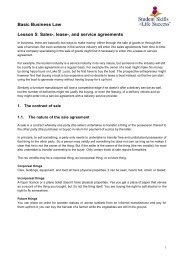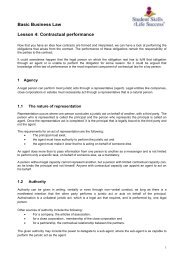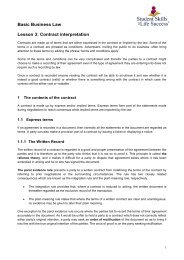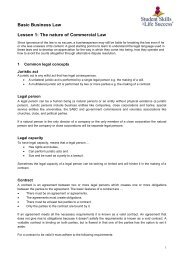Basic Business Law. Lesson 2. Contract Formation
This is the second lesson of the "Student Skills for Life Success" "Basic Business Law" course. The topics covered in this booklet are: 1. Contractual Capacity 2. Agreements 3. Obligations 4. Certainty 5. Lawfulness 6. Possibility of Performance 7. Formalities
This is the second lesson of the "Student Skills for Life Success" "Basic Business Law" course. The topics covered in this booklet are:
1. Contractual Capacity
2. Agreements
3. Obligations
4. Certainty
5. Lawfulness
6. Possibility of Performance
7. Formalities
You also want an ePaper? Increase the reach of your titles
YUMPU automatically turns print PDFs into web optimized ePapers that Google loves.
<strong>Basic</strong> <strong>Business</strong> <strong>Law</strong><br />
<strong>Lesson</strong> 2: <strong>Contract</strong> formation<br />
A contract must meet all the following requirements for it to be valid.<br />
• the parties to the contract must have contractual capacity,<br />
• there must be an agreement or agreements between the parties,<br />
• the agreement must create obligations,<br />
• the agreement must be certain,<br />
• the agreement must be lawful,<br />
• the agreement must be possible of performance and<br />
• prescribed formalities must be complied with.<br />
1. <strong>Contract</strong>ual Capacity<br />
Not all natural or juristic persons are free to enter into binding agreements at will. Sometimes a party who<br />
wishes to contract will have lacking or limited contractual capacity.<br />
Table 1: <strong>Contract</strong>ual capacity of certain legal persons<br />
Personality<br />
Minors younger than seven<br />
Minors older than seven<br />
Persons married ICP<br />
Persons married OCP<br />
Insolvents<br />
Companies<br />
Close Corporations<br />
Partnerships<br />
<strong>Contract</strong>ual capacity status<br />
Lack contractual capacity<br />
Limited contractual capacity<br />
Full contractual capacity requiring partner’s consent<br />
Full contractual capacity<br />
Limited (restricted) contractual capacity<br />
Limited contractual capacity<br />
Unlimited contractual capacity<br />
Lack contractual capacity<br />
1.1. Minors<br />
A minor is an unmarried natural person below the age of 18 years. Minors under the age of seven are known<br />
as infants and lacks contractual capacity while minors between seven and eighteen are known as pupilli and<br />
have limited contractual capacity.<br />
A pupillus can enter into a contract in his own name provided that he or she is assisted by a guardian. If a<br />
minor is the owner of immovable property however he or she will require authorisation from the high court to<br />
sell, mortgage or let the property for more than 10 years.<br />
A limited number of juristic acts can be performed without assistance. For example; a minor of 14 or older<br />
can consent to medical treatment and a minor of 16 or older can become a depositor at a bank.<br />
Persons under 18 can become majors by marrying. If a minor marries he or she will stay a major even if their<br />
partner dies or they divorce prior to their 18th birthday.<br />
Since minors need the assistance of their guardian to enter into a contract it is important to know who the<br />
legal guardian of the minor is.<br />
• If a child is born to married parents then both parents can act as independent guardians.<br />
• If a child is born to unmarried parents then the mother is the guardian.<br />
• If the unmarried mother is a minor herself, then her guardian will also be the child’s guardian until the<br />
mother attains majority.<br />
• If a child is adopted the adopted parents will be the child’s guardians.<br />
Minors assisted by their guardian in the making of a contract will be bound and liable to perform according to<br />
the contract. The guardians will not be liable if the minor does not perform according to the contract.<br />
1
Where a pupillus enters into a contract without his guardian’s assistance he will<br />
not be bound by the agreement and is entitled to the return of any property or money that changed hands<br />
provided that he return what he acquired in return as well.<br />
Example 1: Parental rights and responsibilities<br />
Parental right are often not clear cut.<br />
A friend of yours, who is a famous Bollywood movie star tells you has a child with a South African woman<br />
that he met while shooting a movie in Cape Town a couple of years ago. He tells you that the child is now 12<br />
years old and that he is going to take the child back with him to India under the pretence of a holiday.<br />
Do you think that it is none of your business and that the child will have a better life with her rich father in<br />
India, or you could tell him that what he is planning is wrong, and that the he must consider the will of the<br />
mother and the child?<br />
1.<strong>2.</strong> Married Persons<br />
Marriages can be concluded in community of property or out of community of property. If the parties register<br />
an antenuptual contract then the marriage will be out of community of property. If they do not register an<br />
antenuptual agreement, the marriage will automatically be a marriage in community of property. Customary<br />
marriages, entered after 15 November 2000, are also regarded as marriages in community of property.<br />
Spouses may apply to the court to change their matrimonial property system.<br />
Marriages in community of property<br />
• All assets and liabilities are merged into a single estate.<br />
• The spouses are co-owners of the estate with equal shares.<br />
• They have equal powers of administration of the estate.<br />
• Each spouse has full contractual capacity, but will need consent from their partners to perform certain<br />
juristic acts depending on the seriousness of the action:<br />
o Formal consent - Specific written consent for specific acts in the presence of witnesses<br />
o Written consent - Written consent including a general consent, where the spouse agrees to<br />
be bound by all of the terms of the agreement to which the other spouse is a<br />
party.<br />
o Informal consent - Oral consent including a general consent (often assumed)<br />
• Property acquired and debts incurred after the marriage forms part of the joined estate.<br />
Marriages out of community of property<br />
• The spouses retain the estates they had prior to marriage.<br />
• Each spouse has full contractual capacity to perform juristic acts and need no consent from their<br />
partners to contract.<br />
• Assets acquired during the marriage will be divided equally between the spouses in case of a divorce<br />
as if it forms part of a joined estate. This principle is known as the accrual system.<br />
2
Figure 1:<br />
The consequence of marriage and divorce<br />
1.3. Insolvents<br />
The contractual capacity of an insolvent person is limited to the following extent:<br />
• The person may not contract to dispose of any property attached to the insolvent estate.<br />
• The person needs written consent from the trustee of the estate to enter into any contract that will<br />
adversely affect the estate.<br />
• Written consent is also required if the person is to work for, or have any interest in, the business of a<br />
general dealer or manufacturer.<br />
Unauthorised contracts entered into by the insolvent person will be voidable at the option of the trustee.<br />
1.4. Companies<br />
The contractual capacity of a company is limited in that it can only enter into contracts that will further its<br />
main objective as set out in its memorandum of association or any ancillary objectives. The companies act<br />
also allows a company to borrow, lend or invest, to operate a bank account and to acquire property etc. so<br />
that it can attain its main and ancillary objects.<br />
Where a company contracts outside its area of business the other party is protected and can enforce the<br />
contract<br />
3
1.5. Share block schemes.<br />
Sometimes a person can acquire a share in a company that will allow him/her to use and occupy a specific<br />
cottage, flat or apartment in a building owned by a company. He/she does not become the owner of the unit,<br />
but has a right to use and occupy it, while it remains the property of the company. The company operating<br />
the share block scheme is called a Share Block Company and retirement villages often operate in this<br />
manner.<br />
If the offending company is a share block company the contract will be void, but the other party will have a<br />
claim against the person who contracted on behalf of the share block company.<br />
1.6. Close Corporations<br />
Close corporations (CC’s) also have legal personalities separate from its members but differs from<br />
companies in that it has unlimited contractual capacity. This means that a close corporation can enter into an<br />
agreement that falls outside the scope of the main objectives of the CC.<br />
In the past this characteristic of CC’s has led to some abuse by CC members. For example, the members<br />
would buy a house and use it for the personal benefit of the members only, but still reflect it as a business<br />
expense.<br />
This is probably one of the reasons why the new Companies Act does not allow for the registration of new<br />
CC’s, although it does allow for the continued operation of existing CC’s.<br />
1.7. Partnerships<br />
A partnership is not a separate legal entity and as such lack contractual capacity. If any one partner<br />
contracts with another party in the course of business, all the partners will be bind.<br />
<strong>2.</strong> Agreement<br />
There will be an agreement between two or more parties if there is a meeting of the minds. This meeting of<br />
the minds will be indicated by an offer made by one party and an acceptance of that offer by another party.<br />
The party making the offer is known as the offeror and the party accepting the offer as the offeree.<br />
In order for a valid agreement between the parties to come into being, the following rules of offer and<br />
acceptance must be adhered to:<br />
• One of the parties must have made an offer.<br />
• The offer must have been communicated to the offeree.<br />
• The offer must not have been revoked or have lapsed.<br />
• The offer must have been accepted in the prescribed manner.<br />
• The offer must be accepted by an intended person.<br />
• The acceptance must be communicated.<br />
• The acceptance must be communicated in the prescribed manner, within the prescribed time and at<br />
the prescribed place.<br />
<strong>2.</strong>1. One of the parties must have made an offer.<br />
Offers can be made in writing, orally or by non-verbal conduct. Whether or not an act amounts to an offer<br />
depends on the intention of the party performing it as illustrated by the following table.<br />
4
Table 2: Actions and intentions of parties<br />
Act Intention Offer<br />
Display or advertise goods with a price<br />
To invite prospective purchasers to do<br />
business<br />
No<br />
Call for bids at an auction<br />
• An auction with reserve To call for offers No<br />
• An auction without reserve To sell the thing to the highest bidder Yes<br />
Invitation for tenders<br />
• Without an undertaking To invite the submission of offers No<br />
• With an undertaking<br />
To contract with the party that best meet the<br />
set criteria<br />
Yes<br />
<strong>2.</strong><strong>2.</strong> The offer must have been communicated to the offeree.<br />
A party can only accept an offer if it is aware of its existence. For example, if you find a lost dog and return it<br />
to the owners, you will not be entitled to a reward even if the owners offered a reward for the return of the<br />
dog. You were not aware of the offer when you performed the act (returning the dog) that would have entitled<br />
you to the reward.<br />
<strong>2.</strong>3. The offer must not have been revoked or have lapsed<br />
The offeror can revoke his offer any time before acceptance by communicating his or her intention to revoke<br />
the offer to the offeree. If however an option was granted, then the offer cannot be revoked during that<br />
period. (An option is an undertaking to keep the main offer open for a certain period.)<br />
An offer lapse when …<br />
• the offer is rejected,<br />
• a counter offer is made,<br />
• the acceptance does not occur within the prescribed period,<br />
• the acceptance does not occur within a reasonable time,<br />
• either of the parties dies,<br />
• either of the parties becomes legally incapable of making a contract, like when a company goes into<br />
liquidation before a contract is concluded,<br />
• the proposed contract becomes impossible to perform, like when a football player brakes his leg<br />
before signing for a new club or<br />
• where the proposed contract becomes illegal, for example you are in the process of making a contract<br />
to put up banners on a number of street corners for a client, when a new by-law is passed that<br />
prohibits banners on street corners.<br />
<strong>2.</strong>4. The offer must have been accepted in the prescribed manner<br />
Assent in the mind of the offeree alone does not amount to acceptance and the acceptance must be made<br />
clear by some other indication. The acceptance can be indicated in writing, orally or by non-verbal conduct.<br />
The acceptance must be unequivocal and leave no reasonable doubt in the mind of the offeror. Normally<br />
silence or a failure to respond by the offeree will not indicate unequivocal acceptance, but in the following<br />
cases it will: If the offeree is under a duty to speak if he wishes to reject the offer or if the silence is followed<br />
by actions or conduct that indicates acceptance.<br />
Whether or not there is a duty to speak will depend on the specific circumstances and the duty cannot merely<br />
be imposed on the offeree by the offeror.<br />
5
The acceptance must correspond with the offer, because if the offeree indicates<br />
acceptance but on different terms and / or conditions, he is in fact rejecting the<br />
first offer and making a counter offer.<br />
The following table indicates instances where the actions performed are not indicative of a conditional<br />
acceptance or counter offer and therefor these actions will not cause the offer to lapse:<br />
Table 3: Actions that will not cause an offer to lapse.<br />
Action<br />
An inquiry as to the willingness of the<br />
other party to accept different terms<br />
A comment on the terms of the offer<br />
A partial acceptance coupled with a<br />
reservation<br />
An acceptance coupled with a request<br />
An acceptance coupled with the<br />
confirmation of implied terms<br />
Example<br />
“Will you consider a lower price?”<br />
“I think that’s a bit expensive!”<br />
“Ok, I’ll buy the car for R50 000 if the AA report confirms that the<br />
car has never been in an accident”<br />
“Good, I’ll take this TV then; will you please keep it for me until<br />
the weekend?”<br />
“Thanks, I’ll take the insurance policy you offered, but I do have<br />
5 days to change my mind though.”<br />
If the offeror stipulated that the acceptance must be indicated in a specific way then a contract will only come<br />
into being if the offeree complies with that stipulation.<br />
<strong>2.</strong>5. The offer must be accepted by an intended person.<br />
Only a person whom the offeror intended to accept may do so. Some examples are:<br />
• An offer can be made with the intention that it is accepted by a specific person or persons only.<br />
• An offer can be made to a specific person/s with the intention that it is accepted by that person/s or<br />
someone to whom that person/s transfer the offer.<br />
• An offer can be made public with the intention that anyone can accept it.<br />
• An offer can be made public with the intention that a specific person/s be excluded from accepting the<br />
offer.<br />
<strong>2.</strong>6. The acceptance must be communicated.<br />
As a rule the acceptance must be communicated to the offeror, because until he is aware of the acceptance<br />
the parties are not in agreement. This rule is known as the information theory.<br />
The following exceptions to the rule however apply:<br />
• If the offeror indicates that a certain mode of communication must or may be used and the offeree<br />
uses that mode of communication, then the contract is concluded whether the communication was<br />
successful or not.<br />
For example. A salesman tells a client that he must drop him an e-mail to accept a special offer before a<br />
certain time and the clients does that, but they later discover that the e-mail only went through the next day,<br />
after the offer had lapsed. - The salesman will still be obliged to sell the product or service to the client at the<br />
special price.<br />
• If the offeror dispenses with notification of acceptance, then the contract is concluded as soon as the<br />
offeree indicates his acceptance.<br />
• If the offeror makes it impossible or very difficult for the offeree to communicate his acceptance then a<br />
reasonable attempt to communicate the acceptance will be sufficient to conclude the contract.<br />
6
The postal acceptance rule.<br />
Say tour operator Tammy makes an offer to some of her best clients by post.<br />
• Journeyman John decides to accept the offer and does so via the post a day after receiving the offer.<br />
• Annie Actions gets her offer on the same day; she discusses the offer with her friends and phones the<br />
tour operator three days later to accept the offer.<br />
• Johns’ acceptance only arrives the next day.<br />
Who will get preference if there are limited spaces available on the tour?<br />
The postal acceptance rule (also known as the expedition theory) rule states that if an offer is made by<br />
post, then the offeree is tacitly authorised to accept by post and if he does so the contract will be concluded<br />
the moment the acceptance is posted.<br />
Remembering that the first exception to the information theory states that “If the offeror indicates that a<br />
certain mode of communication must or may be used and the offeree uses that mode of communication,<br />
then the contract is concluded whether the communication was successful or not.”, John excepted before<br />
Annie and must get preference even if the tour operator was aware of Annie’s acceptance before John’s.<br />
The postal acceptance rule applies only under certain conditions:<br />
• It applies only to the business sphere,<br />
• it does not apply if the offeror made it clear that the contract will only be concluded on his reception of<br />
the communication,<br />
• the acceptance must be addressed correctly and<br />
• the rule only applies if the offer was made by post or telegram.<br />
Failure of another attempt to communicate the acceptance could lead to the acceptance being posted but<br />
then the contract will only be concluded once the acceptance is received by the offeror.<br />
<strong>2.</strong>7. The acceptance must be communicated in the prescribed manner, within<br />
the prescribed time and at the prescribed place<br />
Where the offeror prescribed a specific mode of communication the offeree is obliged to follow it. If the<br />
offeror merely authorises a mode of communication, or states a preference for a specific mode, the offeree<br />
will still be allowed to communicate his acceptance through other means.<br />
The prescribed time limit for acceptance must be observed or the offer will lapse. If the offeror prescribes that<br />
the acceptance must reach him at a specific place then the offeree will have to comply.<br />
Test your understanding.<br />
Rambo Star is a 17-year-old film actor who wants to buy a new Mercedes SLK. Discuss his legal position in<br />
the following cases:<br />
i) His parents think he’s too irresponsible to drive such a fast car at his age.<br />
ii) They think it is a good idea that will contribute to his star image.<br />
Mr Rich decides to divorce his wife Pearl after 15 years of marriage. Discuss his legal position with regard to<br />
assets in the following cases:<br />
i) They are married in community of property.<br />
ii) They are married out of community of property.<br />
John Whiskey offers to sell his stamp collection to Dave Collector one night in the bar at a price considerably<br />
lower than the market value. Realising what he did the next morning, he phones Dave and retracts the offer,<br />
but Dave tells him that he already accepted the offer via post earlier this morning. Discuss their legal<br />
positions.<br />
7
3. Obligations<br />
<strong>Contract</strong>ual obligations must be distinguished from statutory obligations. A contractual obligation is a duty or<br />
liability to do something or refrain from doing something under the terms of a contract, while a statutory<br />
obligation does not arise from a contractual relationship but is created under a law.<br />
A party to a contract will have both contractual obligations and statutory obligations. For example a borrower<br />
of money will have a contractual liability to pay back the lender, but the statutory obligations arising from the<br />
national credit act will also apply to the parties even if they are not recorded in the contract.<br />
4. Certainty<br />
Certainty is the next requirement for a valid contract. The three main causes of uncertainty in agreements<br />
are …<br />
• The use of vague and indefinite language,<br />
• the failure to agree on material provisions or particulars and<br />
• an unlimited choice by one of the parties to perform or not<br />
4.1. Vagueness and failure to agree on material provisions.<br />
Both the use of vague and indefinite language as well as the failure to agree on material provisions or<br />
particulars will render an agreement void for vagueness.<br />
The court prefers to act as an upholder of agreements rather than a destroyer of them and will therefore take<br />
the following steps to make the intention of the parties certain:<br />
• It will consider tacit terms, applicable customs, the relevant common law and statutory consequences.<br />
• Reasonable certainty and not meticulous precision will be applied as the criterion.<br />
• The court will have regard for any available evidence to cure the vagueness.<br />
• It will apply any incorporated standards or methods by which the omitted details can be determined.<br />
4.<strong>2.</strong> Debtor bound at his option<br />
Any agreement where the debtor is bound to perform only if he chooses to do so will be void for uncertainty<br />
as it is not known whether the debtor will choose to perform or not.<br />
The following does not give the debtor unlimited choice to perform or not and will therefore be enforceable.<br />
• A promise depending on an act that the debtor might choose to perform or not, for example: I’ll pay<br />
you next time I come to Cape Town.<br />
• A promise that makes it possible to determine the extent of the performance, for example: I’ll pay you<br />
back at a reasonable interest rate that you decide upon.<br />
• A promise depending on an ability to perform an act, for example: I’ll pay you as soon as I’m able to.<br />
5. <strong>Law</strong>fulness<br />
If an agreement is prohibited and rendered void by legislation it is known as statutory illegality, while it is<br />
known as common law illegality if it is contrary to public policy.<br />
8
5.1. Statutory illegality<br />
The two most prominent acts that govern business transactions are the Competitions Act of 1998 and the<br />
Consumer Protection Act of 2008. These acts will be discussed in detail in other lessons.<br />
5.<strong>2.</strong> Common <strong>Law</strong> Illegality<br />
Any agreement that has the potential of harming the interest of the community could be declared illegal by<br />
the court. The following are examples of such harmful agreements: Agreements which threaten the safety of<br />
the state, agreements which undermine public order, agreements which undermine the administration of<br />
justice, agreements which undermine the institution of marriage and unconscionable agreements.<br />
Unconscionable agreements include agreements relegating someone to a position of economic servitude,<br />
agreements depriving someone of the benefits of their employment and provisions depriving someone of the<br />
opportunity to defend themselves in legal proceedings.<br />
The courts follow the following guidelines when common law illegality is raised by a party to a dispute:<br />
• A contractual provision will not be regarded as fair simply because the creditor has a good reputation<br />
and has been including the provision for a long time.<br />
• Each case is to be judged on the merits and a provision might be found to be unfair in one case, but<br />
fair in another.<br />
• A contractual provision will not be void for unfairness if a party has a sound commercial reason for<br />
including it in the contract, for example a restraint of trade agreement.<br />
6. Possibility of performance<br />
Parties to a contract must be able to perform the obligations arising from the agreement. They must be able<br />
to perform these obligations both physically and legally.<br />
6.1. Physical Impossibility<br />
Performance will be physically impossible if absolutely nobody would be able to carry it out (objective<br />
impossibility). If the debtor cannot perform because of his own personal situation, the contract will not be void<br />
and the debtor will be liable to pay damages. Even if the performance is objectively impossible the debtor will<br />
still be held liable if he caused the impossibility of performance.<br />
Actions that might make performance impossible.<br />
Say person A sells a cottage to person B and...<br />
Action<br />
the cottage is washed away by the see.<br />
the cottage is blown up by person A.<br />
person A is not the owner of the cottage.<br />
Result<br />
It is impossible to transfer the property and person<br />
A is not liable to pay damages.<br />
It is impossible to transfer the property, but person<br />
A is liable to pay damages.<br />
The transfer would be possible, just not be person<br />
A and he is liable to pay damages<br />
9
6.<strong>2.</strong> Legal Impossibility<br />
Performance will be legally impossible if the law doesn’t make provision for such an action.<br />
7. Formalities<br />
In general a contract can come into existence without adhering to any formalities, for example you can agree<br />
to sell something to a friend without drawing up a contract. But some contracts are required by law to adhere<br />
to certain formalities. The formalities that apply to the selected types of contracts are set out in table form<br />
below.<br />
Table 4: Specific contracts and their prescribed formalities<br />
Type of <strong>Contract</strong><br />
Written<br />
Record<br />
Signatures<br />
Particulars<br />
Agent’s<br />
authority<br />
Notarial<br />
execution<br />
Registrat<br />
ion<br />
Acquiring an interest in<br />
a share block scheme<br />
Alienation of housing<br />
interest to a retired<br />
person<br />
X X X X<br />
X X X X<br />
Alienation of Land X X X X X X<br />
Antenuptual contracts X X X X X<br />
Building contracts X X X<br />
Credit agreements X X X X<br />
Donations X X X X<br />
Lay-by agreements X X X<br />
Learnership agreements X X X X<br />
Long leases X X X X X X<br />
Mineral rights leases X X X X X X<br />
Prospecting contracts X X X X X X<br />
Time share X X X X<br />
Surety X X X<br />
10


